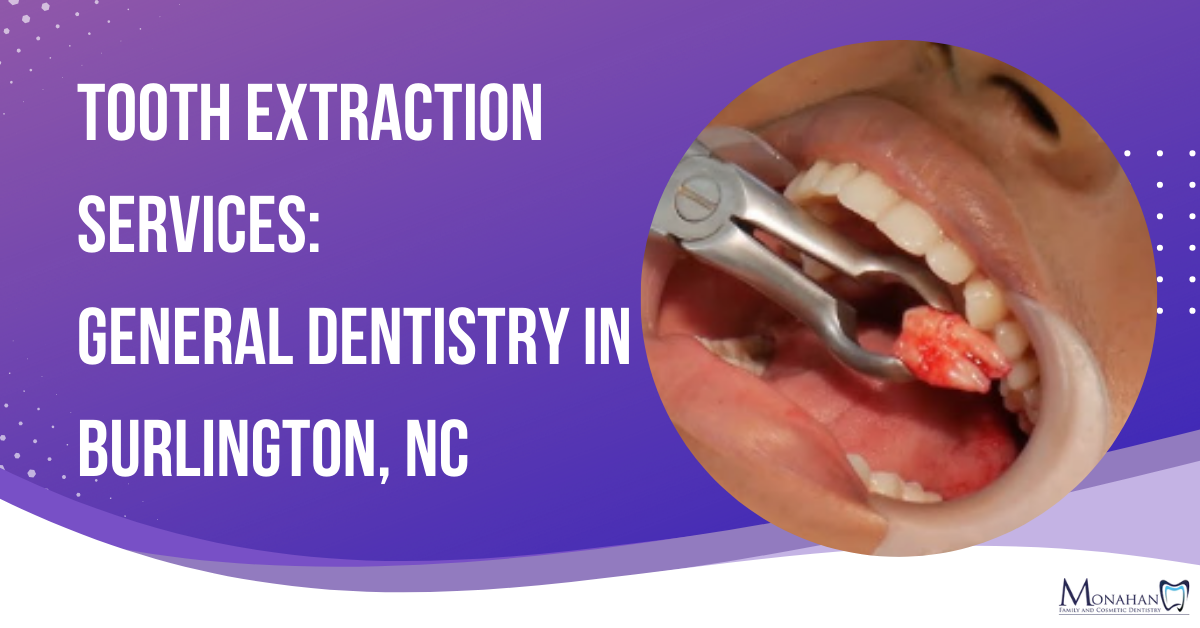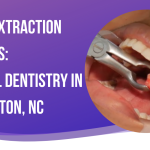Are you facing the tough decision of tooth extraction? If you're in Burlington, NC, finding reliable general dentistry services can make all the difference. Tooth extraction might sound daunting, but it's a common procedure aimed at relieving pain, preventing future dental complications, or simply making way for a healthier smile.
Whether it’s due to decay, injury, or overcrowding, our expert team in Burlington is here to ensure your procedure is as smooth and painless as possible. We combine advanced techniques with a compassionate approach, making sure you feel informed and comfortable every step of the way. So if you need a tooth removed, don’t worry—we’ve got you covered with professional care tailored to your needs.
Common Reasons for Tooth Extraction in General Dentistry
What are the common reasons for tooth extraction in general dentistry? Tooth extraction is a common dental procedure performed for various reasons, each aimed at preserving or enhancing oral health:
- Severe Decay: When a tooth is badly decayed and cannot be saved with a filling or crown, extraction may be necessary to prevent infection from spreading.
- Periodontal Disease: Advanced gum disease can loosen or severely damage a tooth, making extraction necessary.
- Impacted Teeth: Commonly seen with wisdom teeth, impaction can cause pain, swelling, and misalignment of other teeth.
- Overcrowding: To prepare for orthodontics or because there simply isn’t enough room in the mouth for all your teeth.
- Trauma or Injury: Severely broken teeth that cannot be repaired need to be removed to prevent further complications.
Recovery Time from a Tooth Extraction Procedure
How long does it typically take to recover from a tooth extraction procedure? The recovery period after a tooth extraction typically follows this timeline:
- Initial Healing: The first 24-48 hours after extraction are crucial for forming a blood clot in the socket. Activities should be limited to aid healing.
- Reduced Symptoms: Swelling and discomfort usually diminish over the first few days. Complete soft tissue healing often takes about 1-2 weeks.
- Bone Healing: The jawbone will start to heal and fill in where the tooth was, which can take a few months.
Patients should follow their dentist's instructions on oral hygiene, eating habits, and follow-up visits to ensure a smooth recovery.
Potential Complications or Risks Associated with Tooth Extraction
Are there any potential complications or risks associated with tooth extraction? While generally safe, tooth extraction involves some potential risks:
- Dry Socket: This painful condition occurs when a blood clot fails to form in the socket or becomes dislodged.
- Infection: Signs include severe pain, swelling, fever, or pus; antibiotics may be prescribed to treat it.
- Damage to Nearby Teeth: Instruments used during the extraction could potentially chip adjacent teeth or dental restorations.
- Nerve Injury: Particularly in the case of lower wisdom tooth extraction, there is a risk of nerve damage, which can cause numbness or tingling.
Most complications are rare and can be managed with appropriate care and follow-up with your dentist.
Options for Replacinmg an Extracted Tooth 
Can a dentist provide options for replacing an extracted tooth? Post-extraction, several options exist for replacing a missing tooth, which can restore functionality and aesthetics:
- Dental Implants: The most durable and natural-feeling option, suitable for many patients.
- Fixed Bridges: These involve creating a bridge anchored to adjacent teeth to replace one or more missing teeth.
- Dentures: Partial or complete dentures can replace several teeth or all teeth on the upper or lower jaw.
- No Replacement: Especially for wisdom teeth, no replacement might be necessary.
Your dentist will recommend the best option based on your oral health condition, the location of the missing tooth, and your personal preferences.
Minimizing Discomfort During and After Tooth Extraction
What steps can be taken to minimize discomfort during and after a tooth extraction? Effective strategies to reduce pain and accelerate healing include:
- Pre-Procedure: Discuss with your dentist any anxiety or concerns, as they can provide sedatives or anxiety-relieving techniques.
- Post-Procedure Care: Follow the dentist’s instructions for care. This includes taking prescribed pain relievers, applying ice packs to reduce swelling, and resting.
- Eating Habits: Consume soft foods and avoid hot beverages and foods that might disturb the extraction site.
- Oral Hygiene: Gentle rinsing with salt water after the first 24 hours helps keep the area clean and aids healing without dislodging the clot.
Adhering to these guidelines helps ensure a more comfortable recovery and minimizes the risk of complications.
Need a Tooth Extracted? Call a Dentist You Can Trust Today!
As you navigate the process of tooth extraction, understanding the reasons for the procedure, knowing what to expect during recovery, being aware of potential risks, exploring replacement options, and learning how to manage discomfort are all crucial for a smooth experience and optimal dental health. At , we are committed to providing you with comprehensive support and expert care through every step of your dental journey.
If you're considering tooth extraction or looking for a reliable dental practice that prioritizes your comfort and health, don't hesitate. Contact Monahan Family and Cosmetic Dentistry today. Our team of experienced professionals is ready to assist you with personalized solutions and high-quality care tailored to your needs.



